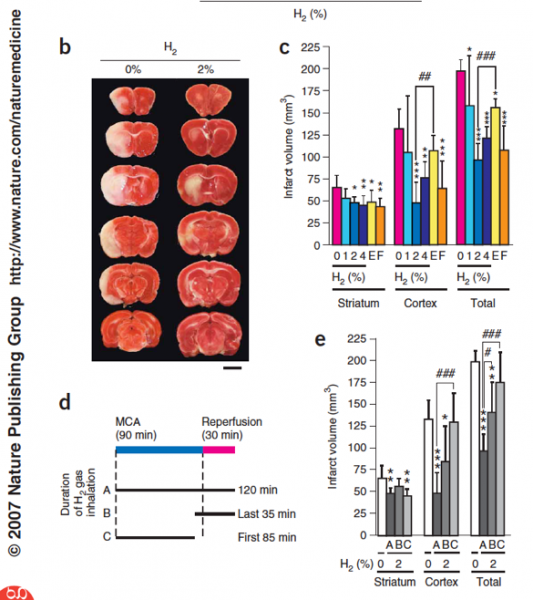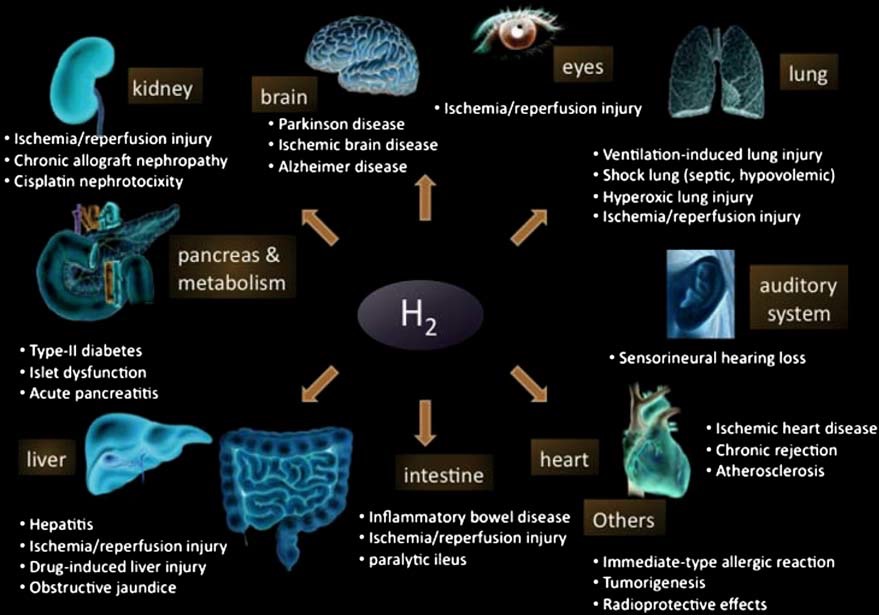Hydrogen is the lightest of all gas molecules. It has no color and no smell at room temperature. As a chemical element, it exists in abundance throughout space, but for the most part hydrogen gas does not exist on Earth as a simple substance, but rather as a compound substance like water.
When making a case for hydrogen, one cannot ignore the role played by intestinal bacteria. Hydrogen is produced regularly in the process of anaerobic fermentation in order for intestinal bacteria within the body to get energy . The amount of hydrogen produced varies depending on the person and the time of the day, but it is reported to be somewhere between 150 mL and 12 L per day.
Hydrogen has been in the spotlight as a new antioxidant and has been reported to selectively eliminate the powerfully toxic reactive oxygen species (ROS) hydroxyl radical in culture .
Molecular hydrogen is a very small, stable,neutrally charged molecule,therefore able to cross the blood-brain barrier,allowing to access DNA and the mitochondria within our cells. Because Molecular hydrogen is a selective anti-oxidant it reduces free radicals ,oxidative stress ,and inflammation which often leads to chronic disease.The role of H2 as an antioxidant has garnered the most attention among many proposed biological activities. H2 is a specific scavenger of •OH and ONOO-, which are very strong oxidants that react indiscriminately with nucleic acids, lipids, and proteins, resulting in DNA fragmentation, lipid peroxidation, and protein inactivation. Fortunately, H2 does not appear to react with other ROS that have normal physiological functions in vivo.
One of the earliest publications on hydrogen as a medical gas was in 1975, by Dole and colleagues from Baylor University and Texas A&M . They reported in the journal Science that hyperbaric (8 atm) hydrogen therapy was effective at reducing melanoma tumors in mice. However, the interest in hydrogen therapy only recently began after 2007, when it was demonstrated that administration of hydrogen gas via inhalation (at levels below the flammability limit of 4.6%) or ingestion of an aqueous-solution containing dissolved hydrogen, could also exert therapeutic biological effects . These findings suggest hydrogen has immediate medical and clinical applications.
In 2007, Dr. Ohta’s team reported in Nature Medicine that inhalation of 2-4% hydrogen gas significantly reduced the cerebral infarct volumes in a rat model of ischemia-reperfusion injury induced by middle cerebral artery occlusion.

Hydrogen was more effective than edaravone, an approved clinical drug for cerebral infarction, but with no toxic effects . The authors further demonstrated that dissolved hydrogen in the media of cultured cells, at biologically relevant concentrations, reduces the level of toxic hydroxyl radicals (*OH), but does not react with other physiologically important reactive oxygen species (e.g. superoxide, nitric oxide, hydrogen peroxide).
In recent years, it has become evident that molecular hydrogen is a particularly effective treatment for various disease models such as ischemia-reperfusion injury; as a result, research on hydrogen has progressed rapidly. Hydrogen has been shown to be effective not only through intake as a gas, but also as a liquid medication taken orally, intravenously, or locally.
Hydrogenʼs effectiveness is thus multi- faceted: Molecular Hydrogen acts as an antioxidant , reduces inflammation, organ- and neuroprotective ,protects against DNA damage, aids the mitochondria , reduces allergic reactions and restores homeostasis in the body.
Hydrogen-rich drinking water. Hydrogen is also commonly taken orally as an aqueous solution. Different methods of making hydrogen-rich water include bubbling hydrogen gas , breaking it down electrically, and using magnesium to release hydrogen.
References
1. Ohta S: Molecular hydrogen as a preventive and therapeutic medical gas: initiation, development and potential of hydrogen medicine. Pharmacol Ther (2014) 144: 1-11.
2. Ohsawa I, Ishikawa M, Takahashi K, Watanabe M, Nishimaki K, Yamagata K, Katsura K, Katayama Y, Asoh S and Ohta S: Hydrogen acts as a therapeutic antioxidant by selectively reducing cytotoxic oxygen radicals. Nat Med (2007) 13: 688-694.
972 C.-S. Huang et al.

Figure 1. Therapeutic opportunities of hydrogen in a variety of disease models.
This biomedical research on hydrogen is still in its infancy with only around 1000 articles and 1,600 researchers, but these publications and researchers suggest that hydrogen has therapeutic potential in over 170 different human and animal disease models, and in essentially every organ of the human body . Hydrogen appears to provide these benefits via modulating signal transduction, protein phosphorylation, and gene expressions.
